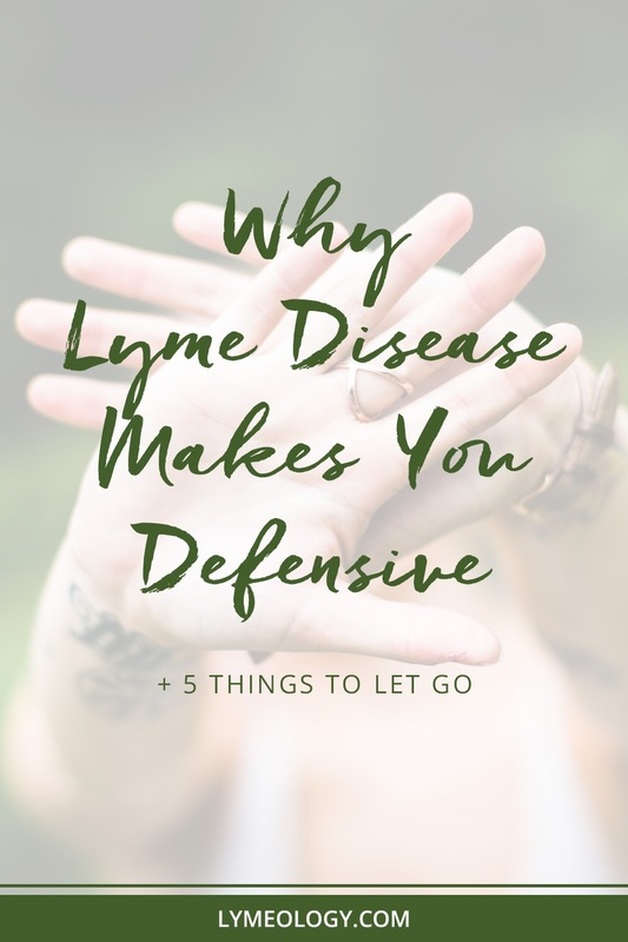|
This article was first published on The Mighty on June 21st, 2016. Most of the links on this post are informational, but a few are affiliate links to help maintain this website. They say that illness comes into our lives at the right time. A diagnosis is a wake-up call. Our bodies are telling us something is out of balance and we need to make changes in order to heal. I say art comes into your life at the right time, as well. I was diagnosed with chronic Lyme disease in January of 2016, after over 10 years of undiagnosed health issues. Around the same time, I discovered Hamilton: An American Musical. Obsessively listening to Hamilton over and over has been a beautiful distraction from my constant pain. Sometimes I turn it on to provide me with the motivation to fight through my chronic fatigue to do a chore or two around the house. Beyond that, writer Lin-Manuel Miranda's lyrics have been an inspiration as I accept this illness and learn to live fully in spite it. Alexander Hamilton beat the odds over and over and that's what I intend to do as well. Here are five lessons about chronic illness I learned from the lyrics of Hamilton. 1. There's a million things I haven't done, but just you wait." This lyric is in the title song of the musical, which chronicles Alexander Hamilton's young life when he escaped dire circumstances to reach America. He fueled the fire of his ambition with the wood of his tragedy. Due to my illness, I feel like there are million things I haven't done. People who are ill often feel like life is passing them by. Chronic illness can either be your anchor or your springboard. It can drag you down or propel you into the person you were meant to be. When people who are ill find a way to live out their purpose, well, just you wait. 2. "Scammin' for every book he could get his hands on." This line is also in the title song. One of the ways Hamilton was able to rise above his station was by educating himself. Chronic illness patients are information junkies. We read book after book trying to find anything to help us heal. Many people say having a chronic illness gives you a Ph.D-level of education in the medical field. Chronic illnesses, like autoimmune disorders, or chronic infections, like Lyme, are said to be incurable. The only treatment is medication to manage our symptoms. There are thousands of books out there written by experts who offer different solutions, such as diet or other natural means of healing, and believe me I've read almost every single one. Like Hamilton, we have to be our own best advocate and learn everything there is to know. 3. "Look around, look around at how lucky we are to be alive right now." This lyric is a present throughout the musical. It speaks to how lucky people were to be alive during the revolution and witness history in the making. Gratitude is the antidote to any illness. We must take notice of our good fortune in the midst of pain. No matter what, we are lucky to be alive. In the late 1700s it was witnessing the birth of new nation; today, it could be thousands of things: modern conveniences, advancements in medical care, our friends and family, the list goes on and on. If you look around enough, you will always find something to be grateful for. 4. "I am not throwing away my shot." This to me is the most important lesson from Hamilton. Seeing it is the masterpiece of the show, I'm guessing Lin-Manuel Miranda thinks so, too. Throughout the show, Hamilton continuously reminds himself not to throw away his shot. I started doing this in my own life. When I'm having a bad day I tell myself not to throw away my shot. I might go out and meet a friend, write that blog post, or call my doctor about a new treatment. Anything to keep myself from being idle. It is important to note that being idle is different from being at rest. Those of us with chronic illness need a great deal of rest. Rest is intentional, idleness is not. We have one shot at this life, no matter what cards we have been dealt, and we can't throw it away. 5. "When you knock me down I get the f*ck back up again." My favorite line from the entire musical. I swear, someday I’m going to hurt myself yelling this while driving in my car. It is sung/rapped by the character Hercules Mulligan (seriously, that was his name), a spy during the Revolutionary War and friend of Hamilton's. If there is one thing people with chronic illness know about, it's getting knocked down. It could be a bad test result, a new painful symptom, or the sting of being left out of yet another social event. Sometimes it feels like we just can't win. And, you know what? Every single time, we dust ourselves off and get the f*ck back up again. We have to, we have no other choice. If you're the one person who hasn't yet listened to this Pulitzer-Prize-winning masterpiece, I suggest you purchase it or stream it immediately. Let it transport you to a different time and place and, if only for a while, away from your illness. "I am the one thing in life I can control, I am inimitable, I am an original, I’m not falling behind or running late, I’m not standing still, I am lying in wait." - Hamilton: An American Musical
0 Comments
This article was first published on Lymeology in 2016, a website that is no longer active. Most of the links on this post are informational, but a few are affiliate links to help maintain this website. What does it mean to be defensive? It means to protect yourself from attack or criticism by staunchly justifying your actions, sometimes preemptively. When you understand the definition it makes perfect sense that people with Lyme are defensive. We constantly have to defend ourselves against the CDC, the IDSA, doctors, insurance companies, and other naysayers. Lyme patients are 100% justified in being defensive. Personally, since my diagnosis my defensiveness has skyrocketed. Look at me sideways when I say I'm on a gluten-free diet and you will get an earful about the relapses of stabbing pain and unbearable nausea I get when I cheat. Maybe you've had similar experiences. I often hear from others in the Lyme community about screaming matches with doctors in emergency rooms or friendships ending over missed attendance to an event. Recently, I've been thinking it doesn’t have to be this way. I'm not my best self when I'm always on the defense. There are some things we need to continue to vehemently defend. We need to continue our fight to be recognized, for more funding, and for better testing, research, and treatment. Our cause is more important now than ever. However, there are some things you may want to let go in order to be a more carefree person. 5 Things to Let Go: 1. The idea that people without Lyme will ever fully understand what it is like. There are a lot of people in my life who are empathic and understanding of my illness, but unless they have Lyme, they will never truly know what it is like. And it's not their fault... I don't know what it’s like to have an illness I've have never had. I've never had Crohn's disease and I imagine I might not be sensitive to all the nuances that occur with that particular illness. Having a chronic illness myself, helps me to be more empathic to others who suffer, but I still will never know what it is like to walk a mile in someone else's shoes. The only people who will understand are other Lyme patients, so if you are feeling lonely or misunderstood, seek out someone who can relate. 2. Unhealthy relationships. It is reasonable to assume people will not always understand what you are going through, but that does not mean you should stay in a relationship that completely lacks understanding and compassion. People often say when you develop a chronic illness you learn who your true friends are. You may even see the true colors of a spouse you thought was your forever partner. This might look like blaming you for not doing washing the dishes, or not showing up to a party when you were bedridden, or saying your a faking your symptoms to get attention. Sometimes you have to let people go. It is a very difficult thing to do, but you need all the support you can get to beat this thing. Negativity and blame are not going to help you get any better. Note: I'm not talking about the "avoiders." I think some people just don't know what to say, so they avoid the conversation. I've been an avoider in the past, so I understand where these people are coming from. The way to deal with an avoider is to reach out to them. They really want to be there for you, they just don't know how to do it. 3. Doctors who don’t listen. There are thousands of doctors. I know sometimes it feels like you've seen them all and the last thing you want to do is start over with another doctor, but you shouldn't have to defend yourself to a medical professional. The first functional medicine doctor I saw was kind and attentive. She gave me a hug when I came to her office, but after awhile I realized she wasn't listening to me. I desperately needed a diagnosis and I was paying her out of pocket to find that for me. She was more concerned with fixing my diet and building my immune strength with supplements. There is no doubt in my mind she was helping me, but when the answer wasn't easy to find, she stopped looking. When I finally made the decision to move on, the very next doctor sent me for a Lyme disease test. Yes, it is exhausting and yes, it is expensive, but when you finally find the right team of doctors you will be so glad you looked for excellence, instead of settling for acceptable. 4. Arguing with strangers on the internet. As stated before, we must stand up for our cause, but it is a waste of your precious time and energy to argue with ignorant strangers. There are so many opinions on the internet. There are people who make it their job to get people riled up in the comment sections of web pages. Unless they are a congressperson or head of the CDC, their misguided opinion doesn’t matter. When it comes to close family and friends it is important to be heard, but when it comes to people you don’t know, sometimes you have to ignore the bully to make them go away. 5. The idea that you will always meet others' expectations. I consistently don't meet the expectations I have of myself, let alone others' expectations of me. We would all rather go to a fancy dinner with friends, a baseball game, the waterpark, or whatever else we're too sick to attend. We would rather not have this disease, but that is not a choice we get to make. You can't go through life never making plans, but when you have Lyme disease sometimes you have to back out of those plans at the last minute. People may be disappointed or hurt, but that's reality. Sometimes your disease will get in the way. It’s like the weather, you can't control it, so it is better not to get upset about it. A simple, "I'm having a bad flare," should suffice for anyone who is a compassionate person. If not, see #2. There is no doubt about it, Lyme disease will make you defensive. Just remember, you don’t have to defend your illness or treatment to anyone. Ultimately, they will either get it or they won't. Let it go, a happier, healthier you awaits. "Sometimes letting things go is an act of far greater power than defending or hanging on." - Eckhart Tolle This article was first published on Lemons 'N Lyme on June 1st, 2016. Most of the links on this post are informational, but a few are affiliate links to help maintain this website. I suppose the silver lining of a chronic Lyme disease diagnosis is that you have a diagnosis. So many of our ranks suffered for years with no answers. I know the sense of relief I felt when I finally knew what was wrong. But that is just the first step. Now you must venture into the strange maze of chronic Lyme disease treatment. Here are a few things I wish I'd known when I asked the doctor, "So, you're sure this is it?" and she confidently and reassuringly said, "yes." 1. You are not alone. It is scary to receive a diagnosis of a "rare" disease, but Lyme disease is not rare. There are 300,000 new cases recognized by the CDC each year, and some estimate a much higher number that go unrecognized or unreported. In my small circle I know 2 other people who have been diagnosed with Lyme. Once you start telling people about your diagnosis you will start hearing the stories, "my cousin has that," "my uncle's sister's best friend's niece has that." Aside from connecting with people who are 2nd and 3rd degrees of separation, I would strongly suggest tapping into the vast Lyme community on the internet. The first place I looked was on Facebook and I joined a closed group for female Lyme disease patients all over the world and a regional closed group for people in Illinois (where I live) to share resources and ask questions. Then, I tapped into the blog world looking for posts from people who have had similar experiences to mine. Finally, I started my own blog to connect with other bloggers and Lyme patients with the goal of being a positive place for Lyme patients to stumble upon, like I did with so many other blogs, including Lemons ‘N Lyme. There are countless blogs and social media feeds related to Lyme disease. I would suggest finding a few that share your attitude and approach to illness. I follow blogs and social media feeds that focus on positivity and a modified diet. Some people may want to follow blogs with a focus on research or a certain treatment protocol. The good thing is whatever you are looking for, you will find it. I truly don't know how Lyme patients diagnosed over 10 years ago coped with this illness without the internet. If possible I would also recommend talking to Lyme patients face-to-face. I eventually joined a Lyme disease support group and have found it to be extremely helpful. If there isn't a support group in your area, I would suggest having coffee with another Lyme patient who lives close by. If you live in a small area and are unable to find any other Lyme patients near you there is the option of Skype or continuing to form connections online. The good people of the chronic Lyme disease community are a wealth of support and information. We have to be, because besides some medical professionals, we are all that we've got. 2. It gets worse and then it gets better (and then it gets worse, better, worse). Now that you and your doctor have decided on a treatment plan, it is time for the roller coaster ride of Lyme recovery. I often describe the Lyme treatment process like an upward moving roller coaster. There are rises and falls, but slowly you will be making upward progress. It just doesn't always feel that way. I've found that on my bad days I can't remember how I felt on my good days and on my good days I can't remember how I felt on my bad days. You've likely read up on Herxheimer reactions. You could feel better for weeks, then have a huge herx reaction as the bacteria die off and leave your body. My doctor has a good strategy for showing me that things are slowly getting better. She documented all the symptoms I brought to her on our first visit (debilitating pain, headaches, dizziness, blurry vision, etc.) and each visit she asks if I still have those symptoms. Most are better, if not gone. I still feel sick, but she helps me see the progress. This is a strategy you could do with your doctor or on your own. Write down all your symptoms and return to the list once a month to add new symptoms and track progress on your old symptoms. 3. Your treatment will not be like anyone else's treatment. Dr. Richard Horowitz calls Lyme disease, "Multi Systemic Infectious Disease Syndrome or MSIDS." That is because Lyme usually comes with multiple coinfections (including parasitic and viral) and attacks multiple systems in your body. So depending on which coinfections you have and which systems they are going after you are going to present differently than any other Lyme patient. There are common symptoms across most Lyme patients, like fatigue, brain fog, and pain, but there are hundreds of other ways the disease can manifest. Other things that will affect your treatment plan are: autoimmune responses (such as Hashimoto’s Thyroiditis), food intolerances (gluten, dairy, etc.), gene mutations (MTHFR), and vitamin/mineral deficiencies (anemia). When you look at the above list it is pretty clear why no treatment plans look alike. Usually they include antibiotics and/or antimicrobials, supplements, and lifestyle changes, but it will always be a variation. 4. There is no right treatment, there is only the right treatment for you. In my first suggestion I tell you to tap into the Lyme community on the internet. In this suggestion, I'm going to tell you to take it with a grain of salt. I tend to skip over any Facebook post that contains any negativity or controversial discussion. There are people who will say never take antibiotics and there are people who say antibiotics are the only thing that worked for them. It is very difficult to land on a treatment that you are comfortable with. When I was undiagnosed, I said no to many different medications, including antibiotics. At the time, I just wasn't comfortable with that particular treatment. I feel like at this stage of my disease I am on the right treatment for me, so I tend to take with a grain of salt advice on what to take or not take. I'm always open to a new approach, but it has to be something I am comfortable with or it will end up doing more harm than good. 5. There is hope. Lyme disease is a devastating diagnosis and will surely have many days where it feels like an impossible climb. When you are feeling like you will never get better, go online and read one or two stories of recovery. I'm 75% better than when I began treatment and I still have moments where I break down and cry. In these moments I use advice I heard on The Oprah Winfrey Show many years ago. There was a guest who had been hit by a drunk driver and had severe, disfiguring burns covering most of her body. She told Oprah that she allows herself 5 minutes a day to cry and after that she gets up and keep going. When I break down, I let it all out, then I get back up and keep going. It's all we can do. "I'm not telling you it's going to be easy. I'm telling you it's going to be worth it." - Art Williams |
WelcomeI'm Kerry (She/Her/Hers) and I am a licensed therapist, group facilitator, poet, writer, & speaker. This is a place to acknowledge and validate our suffering and trauma, while also learning how to turn toward aliveness and spaciousness. Categories
All
Archives
April 2024
|
|
Copyright © 2024 Kerry J Heckman All rights reserved. Disclaimer.
|
|




 RSS Feed
RSS Feed